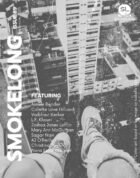This story won the SmokeLong Summer Standalone Flash competition—congratulations! I know you (like me) are a SmokeLong Fitness groupie. What prompt did you write this story for (if any)? What feedback did you get from your workshop members? Did you edit the story at all, or did it just emerge as this fully formed, oddball beauty?
This story emerged from two different SmokeLong Summer prompts: The first was from an “Animal” prompt from Sherrie Flick, and then I revisited the story this year with the prompt “Get Weird” in which I wanted to push the story further and lean into the fabulism. As for editing, yes, I’m an obsessive reviser. With this particular piece, I wrote and re-wrote the second half several times, often arriving at wildly different endings, before finally understanding where the piece needed to land. The initial draft of the story was almost half the length of its final version.
Josh, this is such a brilliant first paragraph! I love the matter-of-fact tone here, and also the narrator’s precocious understanding of the way fathers behave and disappoint: “the man, our father, had grown a beard the way fathers do when they no longer want to be recognized.” I also love how the father reveals himself through his thrashing arms, which “made his disguise fall away”). Will you walk me through your opening paragraph?
First, thank you so much for the kind words. The opening paragraph—the opening sentence—unlocked the piece for me, and this opening was almost unchanged from first to final draft. It drew upon my own memory of encountering my father after a brief absence (my brother and I were summering with our grandparents) and not recognizing him due to his beard. The shock of that has stuck with me, and I wanted to tug on that emotion more.
There is no quoted dialogue in this story at all, and in the beginning, the speech is entirely muted: “Our father claimed it wasn’t a disguise at all. He seemed offended we’d suggest as much.” (The suggestion the boys make is offstage, only articulated through the father’s response). Talk to me about the odd way you write dialogue in the story. How does it fit into the story’s preoccupation with communication?
So much of flash is leaning into the negative space. What needs to be shown on the page, and what can be elided. (There’s of course the father’s elision from the brothers’ childhood, too.) And so much of real life is about (mis)communicating across the gaps in what is said and what is perceived. I suppose I could have made the brothers speak more directly to their father, but that would have been a very different piece.
In the beginning of the story, the narrator is very protective of his younger brother, defending him when the father looks at him sternly: “I told him to leave Jonny out of it, that Jonny couldn’t help it if he didn’t like the sight of blood.” But the last line of the story articulates a different attitude toward Jonny: “But then I thought I’d let Jonny reach his own conclusions. He was sharp, my brother. He understood the way of the world.” Rereading the story, which begins with the word “We,” I see this is really a story about brothers. What makes their relationship shift?
I agree that much of the piece is about brothers and about brothers learning to navigate an unreliable world. But one of the things I kept returning to during revision was how they complemented one another, how the more emotionally charged Johnny has his own insights that the narrator can’t always see, though toward the end, the narrator does begin to realize his little brother perhaps isn’t all that little anymore.
Even though the title suggests the story happens in this brief interval, “On Our Way to the Circus,” there are different indications sprinkled throughout that a much longer timeframe is encompassed here. For instance, Jonny reminds his brother of the ticks they used to pull from their father’s dog, “though later, he claimed not to have remembered her. Said what did it matter, she was gone.” How does this story handle the passage of time? How is it about the passage of time?
Some traumas are a function of time. The adage that time heals all wounds is perhaps too simplistic. What if time itself is a kind of wound?



 The SmokeLong Grand Micro Contest (The Mikey) is now an annual competition celebrating and compensating the best micro fiction and nonfiction online.
The SmokeLong Grand Micro Contest (The Mikey) is now an annual competition celebrating and compensating the best micro fiction and nonfiction online.